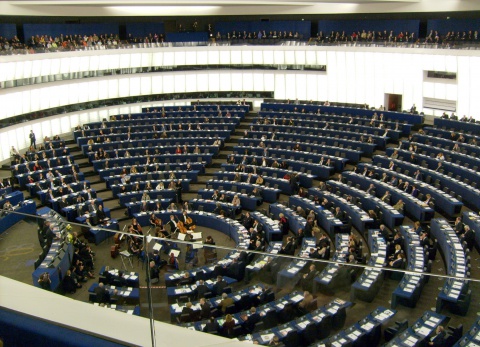Υποβλήθηκε από radiofono.gr στις .
The issue of monopoly tactics concerning digital frequency management in Greece was raised in the European Parliament, following a question by the member of the European Parliament Kostas Chrysogonos. Mr. Chrysogonos from the Greek Left Party asked the European Commision which measures are taken to protect media freedom and healthy media competition, given that the entire TV spectrum is being managed by one single company. The answer by the Europeam Commission clarifies that the fact that only one network operator participated in the auction and was assigned rights of use of radio-frequency does not in itself infringe EC law.
As Mr. Chrysogonos said, "In February 2014, all rights for the use of radio frequencies with national and regional coverage were ceded at a minimal fee for a period of fifteen years to the company ‘DIGEA — Digital Provider SA’, the only bidder in the call for tenders. In August 2014, law 4279/2014 was adopted allowing partnerships between electronic media enterprises of the same kind, and the organisation, operation and control of more than one media enterprise within a group through associated enterprises."
Mr. Chrysogonos also claimed that, "These developments harm competition and pluralism in the audiovisual media, in violation of Article 11 (2) of the Charter of Fundamental Rights, Articles 101 et seq. TFEU and Article 21 (4)(b) of Regulation (EC) 139/2004 of the Council on the control of concentrations between undertakings (OJ L 24, 29.1.2014, pp.1-22). Moreover, the need to ensure the pluralism and freedom of the media in the digital age was confirmed by the EU Council in its recent conclusions (OJ C 32, 4.2.2014, pp. 6-7). In view of the above, will the Commission say what measures it intends to take to protect media freedom, pluralism and healthy competition between broadcasters in Greece?"
The answer was given by Ms Kroes on behalf of the Commission: "The Commission seeks to ensure respect for media freedom and pluralism enshrined in the Charter of Fundamental Rights of the European Union within its competences. According to its Article 51(1), the Charter applies to Member States only when they are implementing European Union law. Under EC law, Member States are required to assign rights of use of radio-frequency, including for broadcasting purposes, based on objective, transparent, non-discriminatory and proportionate criteria, without prejudice to specific criteria and procedures adopted by the Member States with a view to pursuing general interest objectives in conformity with EC law. Different procedures may therefore meet these requirements, including comparative and competitive procedures (auctions, beauty contests). The fact that only one network operator participated in the auction and was assigned rights of use of radio-frequency does not in itself infringe EC law, or precludes competition between content providers."
"In addition, the Commission has exclusive competence to review concentrations between media companies whose turnover meet the thresholds of Regulation (EC) No 139/2004 of the Council on the control of concentrations between undertakings (‘EU Merger Regulation’), while Article 21 of the Merger Regulation allows Member States to review such concentrations to protect media plurality under their national laws. The Commission will remain vigilant with regard to any potential anti-competitive practices or concentrations in the media sector with potential impact in the EEA."
- Συνδεθείτε για να υποβάλετε σχόλια

